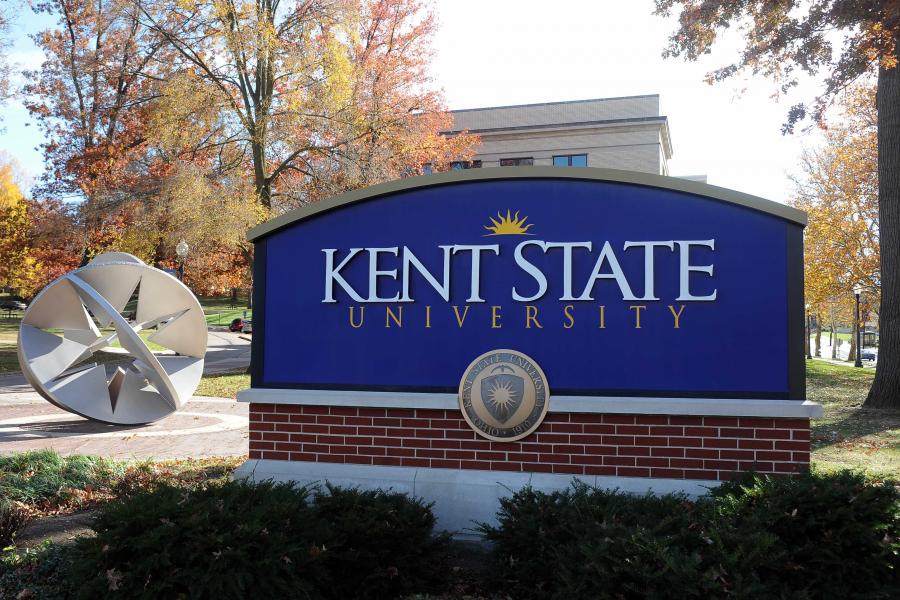Science

New Publication in Physical Review X Reveals Surprising Connection Between Liquid Crystals and Metals
A groundbreaking study published today in Physical Review X, titled "Frank-Read Mechanism in Nematic Liquid Crystals," sheds light on a fundamental connection in the behavior of nematic liquid crystals and crystalline solids. Led by a team of researchers from Kent State University, the study reveals…
From Kent State to an International Ocean Drilling Expedition: Ph.D. Student Studies Volcanically-Derived Nutrients
What started with an interaction on X (formally Twitter) soon led to an opportunity of a lifetime—a chance to conduct oceanographic research alongside some of the industry’s most seasoned scientists and scholars. Originally from Puerto Rico, Tatiana Fernandez-Perez is a third-year Kent State Un…
Kent State Researcher Ranked in the Top Percentage of Researchers Cited Worldwide
For the eighth consecutive year, Mietek Jaroniec, Ph.D., professor emeritus in Kent State’s Department of Chemistry and Biochemistry, has been ranked in the top 1% of both chemistry and materials science researchers cited in the world. This ranking, based on citations in Clarivate’s Web of Science i…
Alumna Digs Up Dream Job at the Cleveland Museum of Natural History
Have you ever seen a Mona monkey skull? Do you know what a Dunkleosteus terrelli is? Well, thanks to alumna Hailey Majewski you can see 3D images of both of these items and many more through the Cleveland Museum of Natural History.

Kent State Biological Sciences Professor Helps Lead International Research Coordination Network to Study Insect Decline
Over half of the described species in the world are insects. Although many people think of insects as pests, they play vital roles and have a big impact on our invaluable ecosystems, as pollinators, helping break down wastes, and as an essential food source for many other organisms.

Climate Scientist Publishes Trends in ‘Weather Whiplash’ Events
Many wonder if climate change is the reason we’ve had 'weather whiplash' or day-to-day dramatic changes from hot to cold or cold to hot. As a climate scientist, Cameron Lee, assistant professor in the Department of Geography in the College of Arts and Sciences at Kent State, gets asked this question a lot. Looking beyond just the average temperatures and statistical means, he decided to take a more analytical look at weather whiplash and add to a growing body of climate change literature examining temperature variability trends.

Kent State Physics Professor Elected as 2020 Fellow of Prestigious Scientific Society
Jonathan V. Selinger, professor and Ohio Eminent Scholar in Kent State University’s Department of Physics, in the College of Arts and Sciences, and the Advanced Materials and Liquid Crystal Institute, has been elected a Fellow of the American Association for the Advancement of Science (AAAS), the world’s largest general scientific society and publisher of the journal Science.

Kent State Physics Professor Elected as 2020 Fellow of Prestigious Scientific Society
Jonathan V. Selinger, professor and Ohio Eminent Scholar in Kent State University’s Department of Physics, in the College of Arts and Sciences, and the Advanced Materials and Liquid Crystal Institute, has been elected a Fellow of the American Association for the Advancement of Science (AAAS), the world’s largest general scientific society and publisher of the journal Science.

Geology Professor and Science Historian Co-Author Article Exploring Eunice Foote’s Climate Experiments From 1856
Recently, Joseph Ortiz, Ph.D., professor and assistant chair in the Department of Geology in Kent State University’s College of Arts and Science, partnered with Sir Roland Jackson, Ph.D., a historian of science at the Royal Institution and the Department of Science and Technology Studies at University College London, to co-author a paper assessing the experiments described in Eunice Foote’s papers from a detailed quantitative perspective and to place them in historical context. They point out the differences between her hypothesis and that of the modern greenhouse effect.

Nuclear Physics Researchers Publish Atom-Smashing Symmetry Experiment Results in Top-Tier Journal
Nuclear physics researchers at Kent State University and all over the world have been searching for violations of the fundamental symmetries in the universe for decades. Much like the “Big Bang” (approximately 13.8 billion years ago), but on a tiny scale, they briefly recreate the particle interactions that likely existed microseconds into the formation of our universe which also likely now exist in the cores of neutron stars.